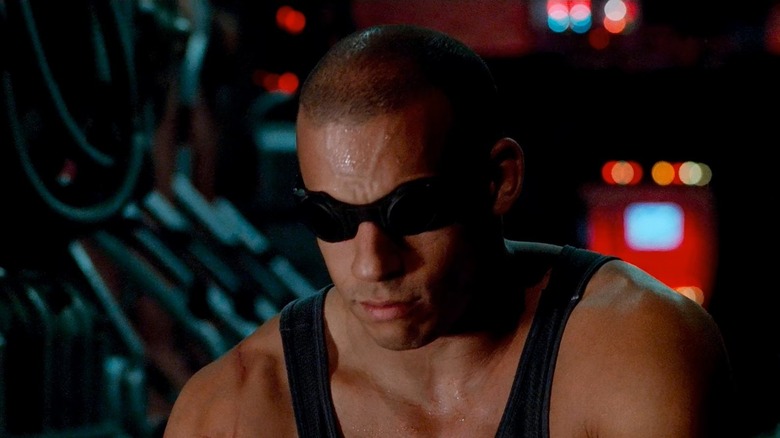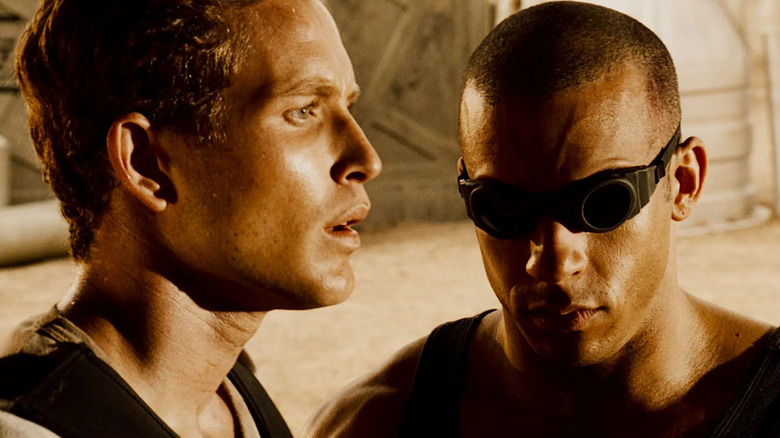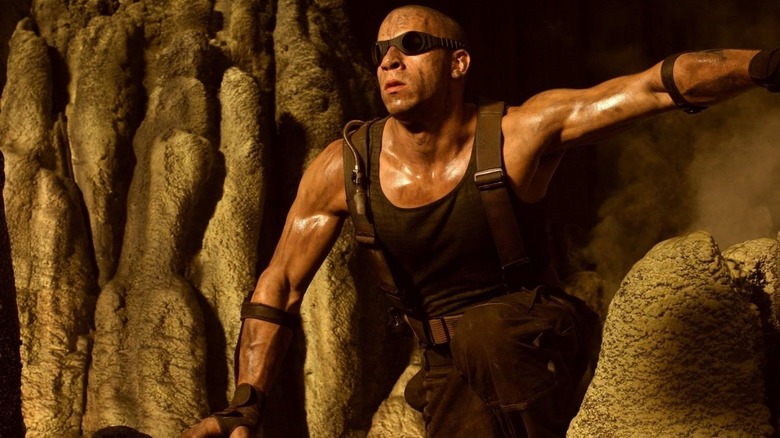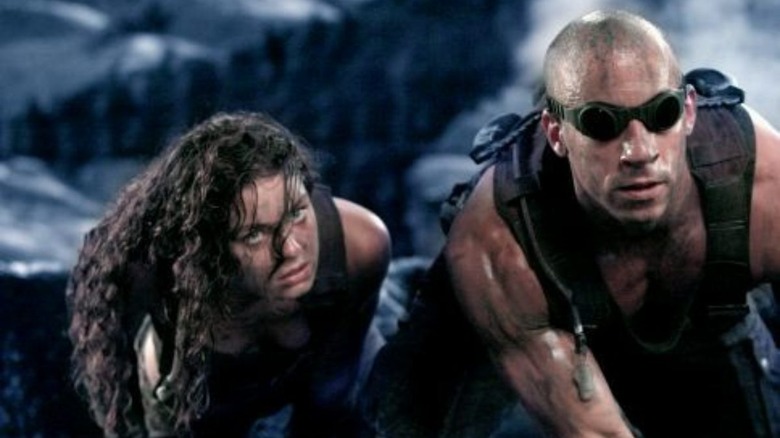Vin Diesel Was Nearly Robbed Of The Chance To Play Pitch Black's Riddick
I assure you this will lead back to "Pitch Black," but first, I open with some context:
In Shane Black's 2005 film "Kiss Kiss, Bang Bang," Robert Downey, Jr. plays a down-on-his-luck petty thief who, by sheer chance, stumbles into an audition one night while fleeing from the cops. His genuine panic is enough to vault him into playing a private detective. Late in the film, Val Kilmer, a real P.I. serving as Downey's coach, reveals that Downey's hiring was, in fact, a ruse perpetrated by the studio. Evidently, the studio had been courting Colin Farrell for the role in question, but Farrell wanted too much money. The studio, as a power play, wanted to smugly prove that they could fill the role without Farrell. Downey's casting was a way to bring Farrell's price down and lure him back to the project.
I mention "Kiss Kiss, Bang Bang" as it details a fictional version of something that happens all the time in Hollywood: A "bankable" star will be approached to play a certain role but will balk, the studio then casts a lesser actor in their place and the bankable star, not wanting to miss out on a potential hit going into production without them, will acquiesce.
Now imagine that story working the opposite way. Imagine if in "Kiss Kiss, Bang Bang" the studio found that Downey was better and decided to move forward with him, knowing that Farrell would have been too difficult to work with.
That's exactly what happened with Vin Diesel in David Twohy's 2000 sci-fi thriller "Pitch Black." Twohy was given the choice between a big star and Diesel, and he chose the latter. It was a good thing for Diesel, as "Pitch Black" proved to be his breakout role.
Star power
"Pitch Black" takes place in a distant future wherein a passenger craft, carrying a group of people (including a dangerous space fugitive named Riddick), crash lands on a remote, uninhabited planet. On this planet, the daytime is scorchingly hot, and the night brings with it swarms of enormous photosensitive space monsters that hide from the daylight. While not trusted due to his violent criminal past, Riddick (Vin Diesel) becomes the reluctant protector of the crash survivors, as he himself — thanks to a futuristic eye condition — is also photosensitive.
In the documentary film "Nightfall: The Making of Pitch Black," now available as an extra on Arrow Video's "Pitch Black" disc, director David Twohy describes the biz's natural propensity toward big stars:
"Everybody, when they start casting a film — no matter the budget — has high hopes that you'll land the "big star" of the day. And we certainly tried those names, and we weren't getting any traction. Because the investors — which, at the time, were Ploygram [Entertainment] — always wanted to ensure their investment with a big star. And I was quite willing to make it with the best talent out there. But they were insisting, even late in the day, that we have some kind of star power in this movie."
But then a pivotal moment occurred, and a different decision was presented to Twohy.
'A pivotal moment'
Revealing his principles, Twohy continued his anecdote, describing a phone call from L.A. that could have taken "Pitch Black" in a new direction:
"There was a strange moment — a pivotal moment — in the casting process. I was down in Australia, I was scouting locations, I was building sets, when a call came from Los Angeles that said: 'Okay, we gave the script to ... Big Action Star of the Day. And he wants to do it.' Unfortunately, this Big Action Star of the Day was known to be a major d*** as well. And so, in a very pivotal moment, I said no. I'm not going to do that. I'm just not going to cast that guy in the movie."
Twohy is coy as to who the Big Action Star of the Day was (who was also a d***), so the casual viewer will have to speculate on their own. All Twohy knew is that he didn't want to spend several weeks in Australia shooting a movie with a difficult star who wasn't even what he wanted for the part. He instead went with the lead actor he preferred, leading to a new movie star being born. Twohy recalled the studio's outrage:
"'Are you telling us you would rather not make the movie than make it with This Guy? Because that's the choice you have right now.' And I thought about it for just a second, and I said 'Yes, that's what I'm telling you. I'd rather not make the movie than make it with That Guy who's going to bring chaos to my set. So they said 'Fine,' and everybody hung up on each other."
'This guy named Vin Diesel'
Twohy wasn't bluffing, but his refusal to cast a notoriously difficult actor led to a return call. Twohy was not fired from the project, but was asked his own advice as to what actor should play Riddick. Twohy knew the name immediately. "I just went back to what I was doing, building sets and scouting locations," he recalled. "Then, the next day they said, 'Okay, look. Forget that idea. Just tell us who the best available actor is.' And we had read this guy named Vin Diesel."
The rest, as they say, is history. "Pitch Black" was made on a modest budget of $23 million and went on to become something of a sleeper hit, grossing about $53 million worldwide and spawning a passionate cult of college-aged fans. The role massively upped Diesel's visibility, and he would next star in another modest genre picture called "The Fast and the Furious," followed by another action-packed star vehicle called "XXX." Each one of these movies would spawn multiple sequels, and Diesel's profile rose with each one. "Pitch Black" itself saw a sequel in 2004 called "The Chronicles of Riddick," and then another in 2013 called simply "Riddick," and Diesel has promised fans a fourth installment in the franchise.
The lesson here is clear: Working with a not-yet movie star who is nevertheless right for the role is often preferable to working with a bankable star who is not.



